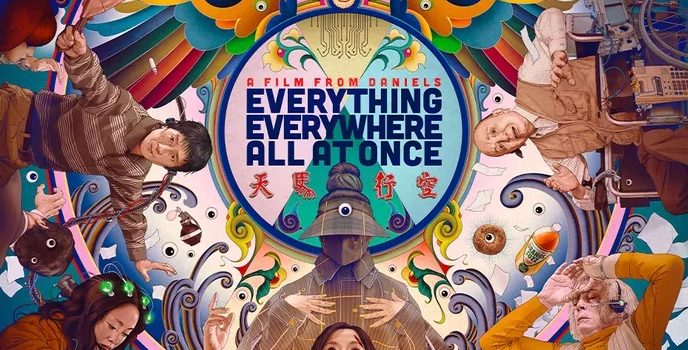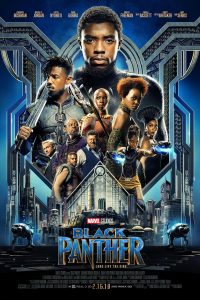What If…? Josh Pearce and Arley Sorg Discuss Everything Everywhere All at Once
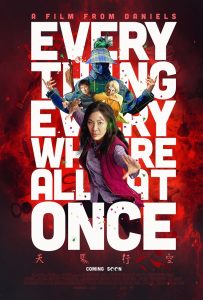 When a rupture threatens the multiverse, ordinary mother and laundromat owner Evelyn Wang (Michelle Yeoh) is recruited by a shadowy organization. They tell her that only she can save the multiverse… but can they be trusted, is any of this real, and besides all of this, can she really help? Evelyn has to figure it out fast – and sort out her taxes at the same time, or the IRS will take her shop away!
When a rupture threatens the multiverse, ordinary mother and laundromat owner Evelyn Wang (Michelle Yeoh) is recruited by a shadowy organization. They tell her that only she can save the multiverse… but can they be trusted, is any of this real, and besides all of this, can she really help? Evelyn has to figure it out fast – and sort out her taxes at the same time, or the IRS will take her shop away!
In many ways, this film might not be exactly what you expect it to be. But it’s also probably far better than you think it will be. There are so many surprises, and this contributes greatly to the enjoyment. You will probably get more out of the experience if you don’t know too much; and it’s hard to review this one without giving away at least some of it. We both loved it – so just go watch it already!
That said, it’s a great movie, so you’ll still enjoy it, even if you go into it already aware of some of the surprises. Just don’t say we didn’t warn you!
Josh: I really enjoyed it. I had a good time. I found myself laughing a lot, but I wanted to take some time to sit with it, because I wasn’t sure if I was responding to the actual content itself, or if I was responding to information overload. I don’t even know how we’re going to review this, because I don’t know how you would talk about it, really.
Arley: For me this was easily one of my favorite movies, period. It was just… massively entertaining. Constantly entertaining on different axes, which is really hard to do.
Josh: It was very intricate. All the pieces have to hit, everything has to move together. A failure on any one of those can throw things way off.
With Everything Everywhere All at Once, an array of interlocking cinematic elements come together to provide a unique experience, one that delivers across a number of important spectrums: acting, plot, cinematography, and more. This sense of a unique experience is even more important given the current era of film and television, when it seems like the bulk of what’s on offer is remake, rehash, spinoff, or sequel – often poorly executed in some critical aspect of the film.
Josh: I like the emotional core of it. It’s nice that there’s all this family drama, that wasn’t really a soap opera – it was real world problems. Everyone’s dealing with the disappointment they feel in themselves, or in the person they turn out to be. That’s probably super real for everyone.
Arley: They had multiple kinds of humor. They had stupid humor, as well as really interesting clever humor, as well as set-ups for later punchlines. Something might seem like a cheap joke at first but then they add to it, and it becomes layered and sometimes even nuanced.
Josh: Like the hotdog fingers.
Arley: Yeah! The way they infuse meaning into things that could otherwise have been just a dumb joke? Just wonderful.
Josh: Storywise, I was surprised because I thought it was going to be a bigger scope, in the sense that I thought she was going to become some secret agent traveling the world or traveling the multiverse. But the only two set pieces were the IRS office and their laundromat. Halfway through, they were still in the IRS office so you start to understand it’s all going to be an internal journey, rather than that she’s going out to save the external world.
Arley: The IRS stuff gave me a touch of Brazil vibes. That underlying satirical commentary on bureaucracy, basically, which you also see in The Hitchhiker’s Guide to the Galaxy, but here it’s not necessarily the main point, it’s just one of many points folded into the movie.
Josh: When the husband had a fight scene with the fanny pack, I was like, oh, that’s literally a Jackie Chan scene, and I read later that they had originally written the script for Jackie Chan before they switched it to a female lead.
Arley: I thought about Jackie Chan, but I actually thought more about Stephen Chow, and specifically Kung Fu Hustle. That movie had comedy but it also had a seriously strong emotional throughline, and Jackie Chan movies don’t necessarily have that. I mean, Drunken Master 2 (The Legend of Drunken Master in the US) is one of his best movies for emotional depth – it’s a powerful polemic against the theft of artifacts. But it’s more about being furious with the British, and by extension, the West. Jackie Chan movies I think generally can be pretty vapid, mainly stunts and comedy; Kung Fu Hustle made me cry, and this movie made me cry.
Josh: Michelle Yeoh was great. She’s 59 and she can still kick ass, which is incredible.
You see Michelle Yeoh posed on the poster and you think it’s a kung fu movie. And… it is a kung fu movie… but not really. It’s an action movie, but not really. It’s a science fiction movie utilizing the multiverse as a major component, but it’s also not really a science fiction movie. It’s all of these things, but it’s not confined to what we generally think of when we think of these things.
 Josh: There’s like 15 different complete movies going on. Every once in a while I wanted them to just go back to people in this universe or that universe, and spend some time learning more about them.
Josh: There’s like 15 different complete movies going on. Every once in a while I wanted them to just go back to people in this universe or that universe, and spend some time learning more about them.
Arley: When I’m going to see a martial arts movie I want specific things, and I need to be impressed, otherwise… well, there are a lot of midrange and worse martial arts movies out there. Even on a martial arts action movie level, this one is good. There weren’t that many real martial arts fight scenes, but the fact that there weren’t that many and I was still massively entertained says a lot. I expected something and it was something different and what it was ended up being better than my expectations, which doesn’t happen often.
Josh: I liked the meta aspect where she’s an actress in one universe, starring in a movie called Everything Everywhere All at Once. That actually confused the people next to me. Part 1 ended, it said “the end” onscreen, and the audience was saying, “No way!” Come on people, they already set up this joke — we’re watching the movie within the movie!
Arley: Keep up, people!
Josh: This is an original story, even though it does touch on a lot of other stuff. It pays homage to or parodies things, like the Ratatouille bit, and there are mentions of The Matrix, among other references.
Arley: They use metanarrative really well, and it adds another layer for people who want to have that conversation. Part of that is the way they play with multiple tropes from multiple genres in multiple ways. The incredibly hilarious scenes with the award in the IRS office, for example. At first, it’s like they’re playing with the whole Chekhov’s gun idea itself, just in placing the thing on a ledge. Later they combine SF trope with the iconic “keep away” martial arts trope (one of my favorite examples of this trope is in one of my favorite Jackie Chan movies, Fearless Hyena! Where he and his master are playing keep away with chopsticks!). Then they switch to metanarrative and show the audience reacting to this super wonderfully absurd scene where these guys are all trying to activate the power, and it’s like, they are making fun of themselves and having a blast doing it. All while delivering Bridesmaids level of fearless, daring humor.
Josh: I really liked the rocks. The film is so frantic, and then it just cuts to silence. It reminds me of A Ghost Story by David Lowery. There’s a part where Casey Aflleck’s been a ghost for so long that all the other people disappear, and it’s just him in a house. He looks out the window to another house and there’s another ghost in there, and they’re just staring at each other in complete silence and complete stillness with the text of them talking to each other. I thought that’s great to put in a movie. Movies are all about moving images, and sound, and it’s the total opposite of that.
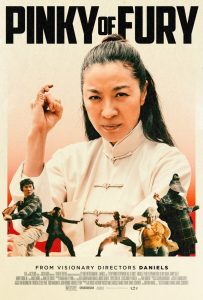 Arley: At first it disrupts, in a positive way, so it totally engages you, it throws you off. And as they build on it, it becomes really meaningful, it becomes really important to the movie. They do this throughout the entire film. Every scene becomes meaningful. They are really good at building and developing subtext. You have these themes on family, on the way you feel about yourself and why, themes on the daily grind and work, but it all works in perfect synergy. Nothing gets weighed down by these themes. They work together to deliver more.
Arley: At first it disrupts, in a positive way, so it totally engages you, it throws you off. And as they build on it, it becomes really meaningful, it becomes really important to the movie. They do this throughout the entire film. Every scene becomes meaningful. They are really good at building and developing subtext. You have these themes on family, on the way you feel about yourself and why, themes on the daily grind and work, but it all works in perfect synergy. Nothing gets weighed down by these themes. They work together to deliver more.
Josh: This movie was long but it didn’t feel too long, I think, because they divided it up into parts. The pacing was good; it was frantic pacing but they get a lot across. It was actually a really efficient movie. It may not seem like it, because there’s so much happening, but all the pieces lock together, nothing is a throwaway.
Arley: They also have these moments where they switch up the mood, the speed, the vibe. Throughout everything was the journey. I really liked everyone’s personal journeys. Everyone had a personal journey.
Josh: It wasn’t just one main character, it was the whole family.
Arley: Everyone had their personal journeys, and they had a personal journey as a family.
Josh: I didn’t notice any huge CGI sequences. Everything was – at least all the fighting – was all practical and stunt people or even Michelle Yeoh herself; it wasn’t CGI characters punching each other in the face. There was a lot of work put into this. The 2001 scene for example, think about how much effort and money and time went into creating that brief moment. And the montage sequence where she’s going through all of the iterations – she’s an alien, then she’s a tree – everything is just for a split second, but they needed full makeup, or maybe some kind of filter. Either way, a lot of work in each of those moments. It really adds to the wealth of the movie. Even the stuff that doesn’t look good, it doesn’t look good on purpose. The raccoon puppet is clearly a puppet, but it has a reason. I kind of like when a film takes a step back from realism, to kind of remind you that you’re watching a movie. It doesn’t matter that you’re watching fake stuff because we’re engaging you anyway. We can show you a puppet and you’re still invested in it.
Arley: I love that it’s bilingual! It felt so natural. This is how real life is. I thought it was awesome and I want more shows and movies to do that. There’s Gentefied which does it, maybe a few others.
Even the resolution, similar to our recent discussion of Spiderman: No Way Home, turns out to be innovative, not just in that it stands against action movie tradition by leaning into positivity and healing, but also in the details, the mechanics of how that works. It’s not just a gimmick; it wraps everything up nicely, while continuing to deliver on the promise of cool martial arts action, as well as bringing some of the science fiction ideas into their full potential.
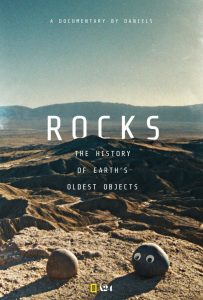 There are certain movies, or pieces of entertainment, that once they come out everything is compared to them: a watershed moment. This is it for multiverse movies. It takes so many ideas and crams them all together, dropping the mic at other filmmakers, saying okay, whatcha got? Kudos to A24, because they seem to be willing to fund and distribute risk takers, so that we’re not just getting the same cookie cutter product over and over again; we’re getting actual filmmaker’s visions, from people who have an idea and can execute on it. Not every film they put out lands, but this one certainly did.
There are certain movies, or pieces of entertainment, that once they come out everything is compared to them: a watershed moment. This is it for multiverse movies. It takes so many ideas and crams them all together, dropping the mic at other filmmakers, saying okay, whatcha got? Kudos to A24, because they seem to be willing to fund and distribute risk takers, so that we’re not just getting the same cookie cutter product over and over again; we’re getting actual filmmaker’s visions, from people who have an idea and can execute on it. Not every film they put out lands, but this one certainly did.
Josh: There’s not much to criticize. Usually we spend a lot of time complaining about a movie, but when it’s a good movie, it’s like – it was good. The end.
Directed by: Dan Kwan, Daniel Scheinert
Written by: Dan Kwan, Daniel Scheinert
Starring: Michelle Yeoh, Stephanie Hsu, Ke Huy Quan, James Hong, Jamie Lee Curtis, Tallie Medel, Jenny Slate, Harry Shum Jr., Biff Wiff

ARLEY SORG, Senior Editor, has been part of the Locus crew since 2014. Arley is a 2022 Kate Wilhem Solstice Award recipient, as well as a 2021 World Fantasy Award finalist and a 2022 Locus Award finalist for his work as co-Editor-in-Chief at Fantasy Magazine. He is a 2022 Ignyte Award finalist in two categories: for his work as a critic, and for his essay “What You Might Have Missed” in Uncanny Magazine. He is also Associate Editor and reviewer at Lightspeed & Nightmare magazines, columnist for The Magazine of Fantasy and Science Fiction, and interviewer at Clarkesworld Magazine. He grew up in England, Hawaii, and Colorado, and lives in Oakland, CA. A 2014 Odyssey Writing Workshop graduate, he can be found at arleysorg.com – where he has started his own “casual interview” series with authors and editors – and on Twitter (@arleysorg).
JOSH PEARCE has stories and poetry in Analog, Asimov’s, Beneath Ceaseless Skies, Cast of Wonders, Clarkesworld, IGMS, Nature, and more. Find him on Twitter: @fictionaljosh, or at fictionaljosh.com. One time, Ken Jennings signed his chest.
 While you are here, please take a moment to support Locus with a one-time or recurring donation. We rely on reader donations to keep the magazine and site going, and would like to keep the site paywall free, but WE NEED YOUR FINANCIAL SUPPORT to continue quality coverage of the science fiction and fantasy field.
While you are here, please take a moment to support Locus with a one-time or recurring donation. We rely on reader donations to keep the magazine and site going, and would like to keep the site paywall free, but WE NEED YOUR FINANCIAL SUPPORT to continue quality coverage of the science fiction and fantasy field.
©Locus Magazine. Copyrighted material may not be republished without permission of LSFF.


